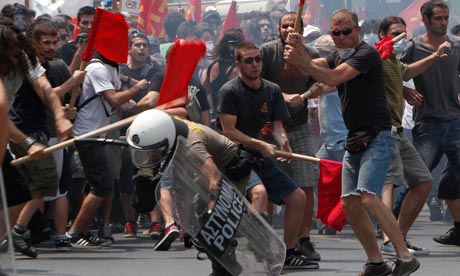Prem Shankar Jha

The Hindu
People are beginning to believe that democracy, in which they had
faith all these years, is part of the problem and, therefore, cannot be
part of the solution
The torrent of anger that erupted all over the country after the
23-year-old physiotherapy student in Delhi — whom the media named
‘Nirbhaya’ — was raped and thrown out of a moving bus has obscured a
profoundly disturbing anomaly: the rape was a criminal act committed by
individuals. But most of the anger of the public has been directed at
the government. Barring a few lapses, the Central and State governments
acted promptly, and with commendable efficiency. The Delhi police
captured the alleged rapists within hours and the government spared no
expense in its attempt to save her life.
The police also showed an uncharacteristic restraint in dealing with the
protesters. To control the crowds with a minimum of violence, policemen
put themselves repeatedly in harm’s way. A constable, P.C. Tomar, laid
down his life doing his duty. Many others were injured.
The Delhi High Court and the State government took the pent up
grievances of women’s associations and other human rights groups to
heart and acted speedily to meet their demands. The former set up five
special courts to hear the backlog of rape cases. The Lt. Governor made
it mandatory for police stations to register all complaints of rape and
other crimes against women. So why did the media and the public spare no
effort to shift as much of the blame as possible on to the shoulders of
the state?
Smouldering anger
The answer is that the rape acted as the trigger for an older, and
deeper, anger in people — one that has been smouldering for years in
their hearts. This stems from a profound sense of betrayal. Democracy
was meant to empower them. Instead, in a way that few of them understand
even today, it has done the exact opposite.
Empowerment requires the rule of law. People feel empowered only when
they know that they have rights, and that the institutions of government
exist, first and foremost, to enforce them. The rule of law is,
however, only another name for justice. Empowerment therefore requires
justice. The bedrock from which the anger that erupted on December 17
sprang is the denial of justice. In spite of being a democracy for 65
years, the Indian state has not been able to create something that
people value even more than material benefits: a just society. It has
achieved this unique feat by making both its elected legislators and its
bureaucracy, not to mention its lower judiciary, immune to
accountability. It has therefore become a predatory state that the
people have learned to fear.
The hallmark of the predatory state is the universality of extortion. In
India, we regularly lump extortion together with bribery under the
generic title of corruption. In doing so, even the most ardent of
reformers inadvertently conspire with the predators to hide the true,
ugly, face of our democracy. Bribery and extortion are, in fact, two
entirely different forms of predatory behaviour, and have markedly
different effects upon the relationship of state with society.
Bribery is voluntary. The bribe giver chooses to give money or favours
to influence a choice, steal a march over rivals, or hasten (sometimes
delay) a decision. Bribery harms the economy and society cumulatively
over a period of time by preventing optimal choice, increasing cost and
lowering the quality of the product or the service rendered. But it has
limited political impact because it is a voluntary transaction between
consenting adults and the injustice it does is confined to a small
circle of rivals.
Extortion is an entirely different form of predation. It requires no
contract; no negotiation; and therefore no element of consent. It is a
simple exercise of brute power by an employee or representative of the
state over the citizen. Its commonest form is to deny the citizen the
services to which he is entitled until he agrees to make a ‘private’
payment to the functionary in whom the power of the state is vested.
Every act of extortion is a fresh reminder to the citizen of his or her
impotence. This becomes complete if he or she is denied redress for the
abuse of power.
In India this has been all-but-denied not simply by law but by the
Constitution itself. Article 311 of the Constitution reads: “No person
who is a member of a civil service of the Union or an all India service
or a civil service of a State or holds a civil post under the Union or a
State shall be dismissed or removed by an authority subordinate to that
by which he was appointed.” It makes it clear that this injunction
applies to not only civil but criminal cases as well. For the Central
services, the empowered Authority is the President of India; for the
State civil services, it is the Governor. This has meant that no
prosecution can by initiated without the permission of the Central or
State government. As the dismal experience of the Central Vigilance
Commission has shown, in civil cases this permission is rarely given.
Complaints against police
One set of figures illustrates the impunity with which civil servants
can break the law. According to the National Crime Records Bureau’s
annual report Crime in India 2007, between 2003 and 2007 citizens
filed 282, 384 complaints of human rights abuses against the police. Of
these only 79,000 were investigated; only 1,070 policemen were brought
to trial and only 264 — less than one in a thousand — were convicted.
All but a handful stayed on at their posts, free to wreak vengeance on
those who had dared to complain against them. It is therefore a safe bet
that the actual number of such abuses is at least 10 times the number
reported. It helps to explain why a girl who filed a complaint of rape
with the police in Lucknow about two months ago was raped by the Station
House Officer, then repeatedly by the investigating officer, but could
not muster the courage to get the latter caught, and report the former
till she felt empowered by the protests in Delhi.
The Constituent Assembly lifted Article 311 almost verbatim from a
clause in the Government of India Act 1935 whose purpose was to protect
British civil servants, notably the police, from incessant harassment by
sharp-witted Congress lawyers. But the 1935 Act did not put the civil
servant above the law. This was because he could be held accountable, as
Edmund Burke had shown, by the British Parliament. In independent
India, however, this restraint was destroyed by the progressive
corruption, and criminalisation, of the political class that it now
serves.
The root cause of both is the lack of any provision in the Constitution
for the financing of elections. In Britain where the average
constituency covers 380 square kilometres and has around 60,000 voters
this is a nuisance. In India where the parliamentary constituency covers
6,000 sq km and holds 1.3 million voters it has proved a catastrophe.
In the 1950s, the need for funds was met to a large extent by the rising
industrial class and by the Princes. But when these two began to desert
the Congress in favour of the Swatantra Party and the Jana Sangh in the
1960s, Indira Gandhi banned company donations to political parties and
abolished the privy purses. After that the only way in which political
parties could stay in the game was to break the law.
Over the ensuing decades, two sets of predatory networks have developed
to finance, or otherwise influence, elections. The first is of criminals
who provide the muscle to intimidate voters; the second is of local
money-bags and power-brokers who rally support for candidates belonging
to one or the other party in exchange for favours when it comes to
power.
As these have become more entrenched, they have virtually eliminated
intra-party democracy at the grass roots and progressively reduced the
number of constituencies in which State and Central party leaders can
bring in fresh candidates chosen on the basis of merit. In the current
Parliament, for instance, at the last count 159 MPs had criminal charges
pending against them. Another 156 are second generation ‘princelings’
whose parents established the clientelist networks that now serve them.
The State Assemblies are even more closed to new aspirants: 44 per cent
of the MLAs in Bihar, 35 per cent in West Bengal and 30 per cent in
Gujarat face criminal charges. The proportion of ‘pocket boroughs’ is
also higher in the States than at the Centre.
Predatory state
The perennial need for money lies at the roots of the predatory state
that India has become. Today, its ruling class consists of corrupt
politicians who are served by an extortionate bureaucracy and police
that are shielded from public wrath by nothing less than the
Constitution of India.
In earlier decades, people’s anger was held in check by their faith in
the democratic system. They therefore gave vent to their demand for
accountability in the state by turning out to vote in ever larger
numbers and regularly overthrowing incumbent governments. Only in recent
years has it begun to dawn on them that democracy has become a part of
the problem and cannot therefore be part of the solution. The protest is
therefore moving closer to the borders of revolt. This has been
apparent in the Maoist uprising that began in 2005, and has driven the
state out of large parts of 83 districts in the country.
The Anna movement last year was another turning point because it was the
first time that the urban middle class took to the streets. December’s
mass protests in Delhi were the second time. History teaches us that
this is the point at which the state usually begins to crumble. Were
this to happen in India, it would not lead to the emergence of a more
just and accountable Indian state but to its disintegration.
There is still time for our Central and State leaders to remember that
no society that has lost its sense of justice, and, therefore, its moral
legitimacy, has survived for long. But they are beginning to run out of
it.
(The writer is a senior journalist)





